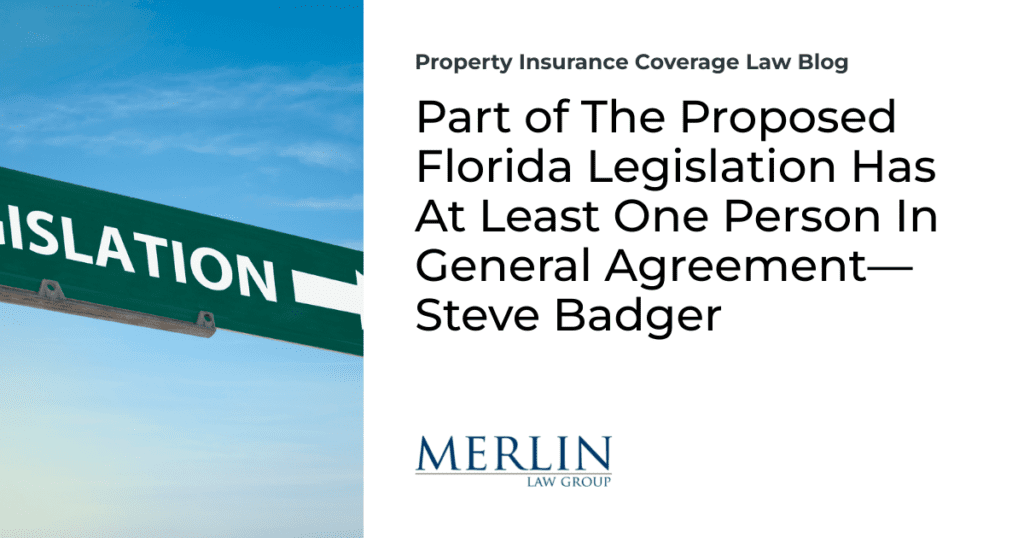Part of The Proposed Florida Legislation Has At Least One Person In General Agreement—Steve Badger

The recently filed and quickly-to-be-heard proposed Florida insurance laws noted in yesterday’s post, Breaking News—Florida Senate Proposes New Insurance Legislation, finds Steve Badger in general agreement with this proposed unfair claims practice:
Altering or amending an insurance adjuster’s report without including on the report or as an addendum to the report a detailed list of all changes made to the report and the identity of the person who ordered each change. Any change that has the effect of reducing the estimate of the loss must include a detailed explanation why such change was made;
These proposed laws can be traced to the work of Washington Post journalist Brianna Sacks whose article I noted in Insurance Company Corrupt Claims Culture Exposed by Washington Post. My impression is that parts of the proposed legislation address Florida’s insurance company executives skimming money from the Florida insurance companies, as reported by Tampa Bay Times journalist Lawrence Mower in Florida Insurance Company Execs Saw Big Payouts in Years Without Hurricanes.
I was on an American Policyholder Association Board of Advisors Zoom conference when Mathew Mulholland sent me a link to Steve Badger’s previous response to the Washington Post article:
My response to the 7 public adjusters, 5 policyholder attorneys, and 2 roofing contractors who all sent me a link to yesterday’s Washington Post article….
‘Yes, I saw it.’
I’ll say the same thing I posted several weeks ago when this issue was first reported…..
If these Florida insurance companies were changing the independent adjusters’ factual observations of what they found to be damaged and then using those factual changes as the basis for the claim measure sent to the insured, then, yes, that is wrong. I can understand the allegation such conduct could be fraud.
But, if these insurance companies were only applying their policy coverage to the factual findings of the independent adjusters, I have no problem with an insurance company changing an IA’s estimate to be consistent with the coverage provided by the applicable policy. Of course, an insurance company only owes for damage that is covered by its policy.
With that said, making those changes and leaving the estimate on the independent adjuster’s letterhead is not a preferred practice. But I wouldn’t call it fraud.
The best practice would be to revise the independent adjuster’s estimate to be consistent with the available coverage and put the revised estimate on the insurance company’s letterhead. Then send the insured both estimates, one showing everything that was found to be damaged and one showing what damage is actually covered by the policy.
I keep telling people that some insurance defense attorneys have a heart and enough courage to state their opinion about the importance “good faith” claims practices. We should listen carefully to and understand those who are working for the insurance claims industry, even if we disagree. Many are ethical and deeply care about making the insurance product work for society.
A Bill Analysis and Fiscal Impact Statement was published yesterday, and it may be easier for many to read for an understanding of what the proposed law does. It notes that the proposed law:
Prohibits authorized and surplus lines insurers from cancelling a property insurance policy during any pending claim until after repairs are complete;
Requires that Citizens cover property with open claims that are being handled by FIGA (Florida Insurance Guaranty Association);
Prohibits the Office of Insurance Regulation (OIR) from waiving its review of policy forms for 3 years for any insurer that has violated the Insurance Code;
Provides that the prohibition on applying any other deductible under the policy if a roof deductible is applied encompasses any other loss to the property caused by the same covered peril.
Tolls the time period for filing a property insurance claim during an insured’s active duty military service; and
Clarifies legislative intent that Chapter 2022-271, Laws of Florida, passed during Special Session A in December 2023, (SB 2-A [2022] on Property Insurance) shall not be construed to impair any right under an insurance contract in effect on or before the effective date of that chapter law (December 16, 2022).
Regarding claims handling practices, the proposed law:
Requires OIR to ensure liability insurers are complying with proper claims handling practices by following specified best practices
Creates a 60-day prompt-pay law for non-PIP motor vehicle insurance claims similar to the prompt pay law for residential property insurance claims;
Requires insurers to annually submit their claims manuals to the OIR and attest that the manual comports to usual and customary industry claims handling practices; and
Strengthens the Unfair Insurance Trade Practices Act by:
o Prohibiting altering or amending an adjuster’s report without including a list of changes, who made the change, and an explanation of a change that reduces coverage; and
o Prohibiting payment of bonuses to officers and directors while an insurer is impaired or insolvent.
The first hearing of this bill is tomorrow morning in Tallahassee.
Thought For The Day
Courage is resistance to fear, mastery of fear, not absence of fear.
—Mark Twain



